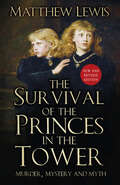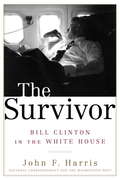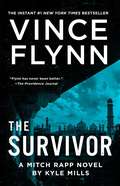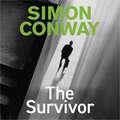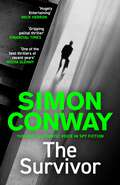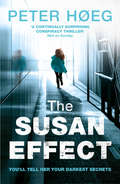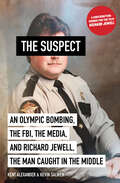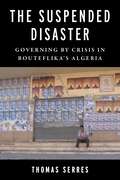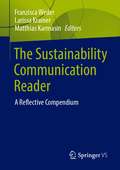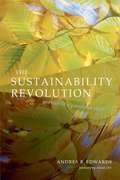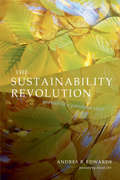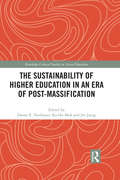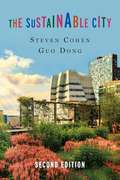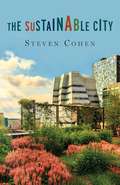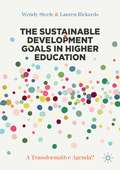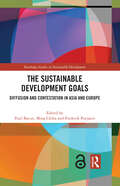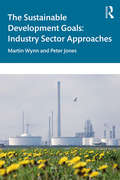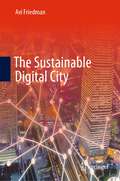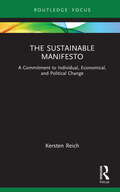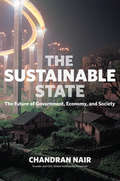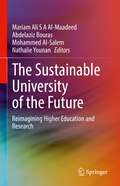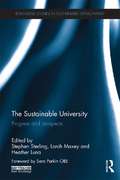- Table View
- List View
The Survival of the Princes in the Tower: Murder, Mystery and Myth
by Matthew LewisThe murder of the Princes in the Tower is the most famous cold case in British history. Traditionally considered victims of their ruthless uncle, there are other suspects too often and too easily discounted. There may be no definitive answer, but by delving into the context of their disappearance and the characters of the suspects, Matthew Lewis examines the motives and opportunities afresh, as well as asking a crucial but often overlooked question: what if there was no murder? What if Edward V and his brother Richard, Duke of York, survived their uncle’s reign and even that of their brother-in-law Henry VII?In this new and updated edition, compelling evidence is presented to suggest the Princes survived, which is considered alongside the possibility of their deaths to provide a rounded and complete assessment of the most fascinating mystery in history.
The Survivor
by John F. HarrisThe definitive account of one of the most accomplished, controversial, and polarizing figures in American historyBill Clinton is the most arresting leader of his generation. He transformed American politics, and his eight years as president spawned arguments that continue to resonate. For all that has been written about this singular personality-including Clinton's own massive autobiography-there has been no comprehensive, nonpartisan overview of the Clinton presidency. Few writers are as qualified and equipped to tackle this vast subject as the award-winning veteran Washington Post correspondent John F. Harris, who covered Clinton for six of his eight years in office-as long as any reporter for a major newspaper. In The Survivor, Harris frames the historical debate about President William Jefferson Clinton, by revealing the inner workings of the Clinton White House and providing the first objective analysis of Clinton's leadership and its consequences.Harris shows Clinton entering the Oval Office in 1993 primed to make history. But with the Cold War recently concluded and the country coming off a nearly uninterrupted generation of Republican presidents, the new president's entry into this maelstrom of events was tumultuous. His troubles were exacerbated by the habits, personal contacts, and the management style, he had developed in his years as governor of Arkansas. Clinton's enthusiasm and temper were legendary, and he and Hillary Rodham Clinton-whose ambitions and ordeals also fill these pages-arrived filled with mistrust about many of the characters who greeted them in the "permanent Washington" that often holds the reins in the nation's capital.Showing surprising doggedness and a deep-set desire to govern from the middle, Clinton repeatedly rose to the challenges; eventually winning over (or running over) political adversaries on both sides of the aisle-sometimes facing as much skepticism from fellow Democrats as from his Republican foes. But as Harris shows in his accounts of political debacles such as the attempted overhaul of health care, Clinton's frustrations in the war against terrorism, and the numerous personal controversies that time and again threatened to consume his presidency, Bill Clinton could never manage to outrun his tendency to favor conciliation over clarity, or his own destructive appetites. The Survivor is the best kind of history, a book filled with major revelations-the tense dynamic of the Clinton inner circle and Clinton's professional symbiosis with Al Gore to the imprint of Clinton's immense personality on domestic and foreign affairs-as well as the minor details that leaven all great political narratives. This long-awaited synthesis of the dominant themes, events, and personalities of the Clinton years will stand as the authoritative and lasting work on the Clinton Presidency.From the Hardcover edition.
The Survivor
by John F. HarrisNEW YORK TIMES BESTSELLER The definitive account of one of the most accomplished, controversial, and polarizing figures in American history Bill Clinton is the most arresting leader of his generation. He transformed American politics, and his eight years as president spawned arguments that continue to resonate. For all that has been written about this singular personality-including Clinton's own massive autobiography-there has been no comprehensive, nonpartisan overview of the Clinton presidency. Few writers are as qualified and equipped to tackle this vast subject as the award-winning veteran Washington Post correspondent John F. Harris, who covered Clinton for six of his eight years in office-as long as any reporter for a major newspaper. In The Survivor, Harris frames the historical debate about President William Jefferson Clinton, by revealing the inner workings of the Clinton White House and providing the first objective analysis of Clinton's leadership and its consequences. Harris shows Clinton entering the Oval Office in 1993 primed to make history. But with the Cold War recently concluded and the country coming off a nearly uninterrupted generation of Republican presidents, the new president's entry into this maelstrom of events was tumultuous. His troubles were exacerbated by the habits, personal contacts, and the management style, he had developed in his years as governor of Arkansas. Clinton's enthusiasm and temper were legendary, and he and Hillary Rodham Clinton-whose ambitions and ordeals also fill these pages-arrived filled with mistrust about many of the characters who greeted them in the "permanent Washington" that often holds the reins in the nation's capital. Showing surprising doggedness and a deep-set desire to govern from the middle, Clinton repeatedly rose to the challenges; eventually winning over (or running over) political adversaries on both sides of the aisle-sometimes facing as much skepticism from fellow Democrats as from his Republican foes. But as Harris shows in his accounts of political debacles such as the attempted overhaul of health care, Clinton's frustrations in the war against terrorism, and the numerous personal controversies that time and again threatened to consume his presidency, Bill Clinton could never manage to outrun his tendency to favor conciliation over clarity, or his own destructive appetites. The Survivor is the best kind of history, a book filled with major revelations-the tense dynamic of the Clinton inner circle and Clinton's professional symbiosis with Al Gore to the imprint of Clinton's immense personality on domestic and foreign affairs-as well as the minor details that leaven all great political narratives. This long-awaited synthesis of the dominant themes, events, and personalities of the Clinton years will stand as the authoritative and lasting work on the Clinton Presidency.From the Hardcover edition.
The Survivor: A Race Against Time To Bring Down Terrorists. A High-octane Thriller That Will Keep You Guessing (A Mitch Rapp Novel #14)
by Kyle Mills Vince FlynnThe #1 New York Times bestselling novel that picks up where the &“tight, right, and dynamite&” (Star Tribune, Minneapolis) The Last Man left off, The Survivor is a no-holds-barred race to save America…and Mitch Rapp&’s finest battle.When Joe &“Rick&” Rickman, former golden boy of the CIA, steals a massive amount of the Agency&’s most classified documents in an elaborate betrayal of his country, CIA director Irene Kennedy has no choice but to send her most dangerous weapon after him: elite covert operative Mitch Rapp. Rapp quickly dispatches with the traitor, but Rickman proves to be a deadly threat to America even from beyond the grave. In fact, mysterious tip-offs are appearing all over the world, linking to the potentially devastating data that Rickman managed to store somewhere only he knew. It&’s a deadly race to the finish as both the Pakistanis and the Americans search desperately for Rickman&’s accomplices, and for the confidential documents they are slowly leaking to the world. To save his country from being held hostage to a country set on becoming the world&’s newest nuclear superpower, Mitch Rapp must outrun, outthink, and outgun his deadliest enemies yet in this heart-pounding adventure that proves that Vince Flynn &“is a master—maybe the master—of thrillers in which the pages seem to turn themselves&” (Bookreporter).
The Survivor: A Sunday Times Thriller of the Month (Jude Lyon #3)
by Simon ConwayA thrilling third instalment in the Jude Lyon series.Jude Lyon of MI6 has narrowly foiled the traitor Fowle's plot to level London, but the public are demanding answers.Answers the government doesn't have. As the country reels, a new populist political figure carves a stratospheric trajectory - but is he all he seems? In Moscow the President is furious. The world now knows the destructive power of the programme his people had been developing, and as the Russians scramble to understand how it got into Fowle's hands, they start to worry that perhaps it could be used against them . . . But Jude Lyon has just one question on his mind: Guy Fowle is missing, with nothing left to lose, So what is he planning next? Seething with political machinations, burning with blood-thumping action, and featuring the best returning MI6 operative since James Bond The Survivor brings the espionage novel crashing into the modern day.(P) 2022 Hodder & Stoughton Limited
The Survivor: A Sunday Times Thriller of the Month (Jude Lyon #3)
by Simon ConwayJude Lyon of MI6 has narrowly foiled the traitor Fowle's plot to level London, but the public are demanding answers.Answers the government doesn't have. As the country reels, a new populist political figure carves a stratospheric trajectory - but is he all he seems? In Moscow the President is furious. The world now knows the destructive power of the programme his people had been developing, and as the Russians scramble to understand how it got into Fowle's hands, they start to worry that perhaps it could be used against them . . . But Jude Lyon has just one question on his mind: Guy Fowle is missing, with nothing left to lose, So what is he planning next? Seething with political machinations, burning with blood-thumping action, and featuring the best returning MI6 operative since James Bond The Survivor brings the espionage novel crashing into the modern day.
The Survivor: A Sunday Times Thriller of the Month (Jude Lyon #3)
by Simon ConwayJude Lyon of MI6 has narrowly foiled the traitor Fowle's plot to level London, but the public are demanding answers.Answers the government doesn't have. As the country reels, a new populist political figure carves a stratospheric trajectory - but is he all he seems? In Moscow the President is furious. The world now knows the destructive power of the programme his people had been developing, and as the Russians scramble to understand how it got into Fowle's hands, they start to worry that perhaps it could be used against them . . . But Jude Lyon has just one question on his mind: Guy Fowle is missing, with nothing left to lose, So what is he planning next? Seething with political machinations, burning with blood-thumping action, and featuring the best returning MI6 operative since James Bond The Survivor brings the espionage novel crashing into the modern day.
The Survivor: Bill Clinton in the White House
by John F. HarrisThe definitive account of one of the most accomplished, controversial, and polarizing figures in American history; Bill Clinton is the most arresting leader of his generation. He transformed American politics, and his eight years as president spawned arguments that continue to resonate. For all that has been written about this singular personality--including Clinton's own massive autobiography--there has been no comprehensive, nonpartisan overview of the Clinton presidency. Few writers are as qualified and equipped to tackle this vast subject as the award-winning veteran Washington Post correspondent John F. Harris, who covered Clinton for six of his eight years in office-as long as any reporter for a major newspaper. In The Survivor, Harris frames the historical debate about President William Jefferson Clinton, by revealing the inner workings of the Clinton White House and providing the first objective analysis of Clinton's leadership and its consequences. Harris shows Clinton entering the Oval Office in 1993 primed to make history. But with the Cold War recently concluded and the country coming off a nearly uninterrupted generation of Republican presidents, the new president's entry into this maelstrom of events was tumultuous. His troubles were exacerbated by the habits, personal contacts, and the management style, he had developed in his years as governor of Arkansas. Clinton's enthusiasm and temper were legendary, and he and Hillary Rodham Clinton--whose ambitions and ordeals also fill these pages--arrived filled with mistrust about many of the characters who greeted them in the "permanent Washington" that often holds the reins in the nation's capital. Showing surprising doggedness and a deep-set desire to govern from the middle, Clinton repeatedly rose to the challenges; eventually winning over (or running over) political adversaries on both sides of the aisle-sometimes facing as much skepticism from fellow Democrats as from his Republican foes. But as Harris shows in his accounts of political debacles such as the attempted overhaul of health care, Clinton's frustrations in the war against terrorism, and the numerous personal controversies that time and again threatened to consume his presidency, Bill Clinton could never manage to outrun his tendency to favor conciliation over clarity, or his own destructive appetites. The Survivor is the best kind of history, a book filled with major revelations--the tense dynamic of the Clinton inner circle and Clinton's professional symbiosis with Al Gore to the imprint of Clinton's immense personality on domestic and foreign affairs--as well as the minor details that leaven all great political narratives. This long-awaited synthesis of the dominant themes, events, and personalities of the Clinton years will stand as the authoritative and lasting work on the Clinton Presidency.
The Susan Effect
by Peter HøegYou'll tell her your darkest secretsSusan Svendsen has an unusual talent. She is an expert in finding out secrets. People feel compelled to confide in her and unwittingly confess their innermost thoughts. Her whole life, she has exploited this talent, but now her family is in jeopardy and there is a prison sentence hanging over her head.Then Susan gets a timely offer from a former government official: use her power one more time and have all charges dropped. But there are some powerful people determined to stop her.
The Suspect: An Olympic Bombing, the FBI, the Media, and Richard Jewell, the Man Caught in the Middle
by Kevin Salwen Kent AlexanderThe “intensively reported and fluidly written” true-crime account of the heroic security guard accused of the 1996 Centennial Olympic Park bombing (Wall Street Journal).On July 27, 1996, security guard Richard Jewell spotted a suspicious bag in Atlanta’s Centennial Olympic Park, the town square of the 1996 Summer Games. Inside was a bomb, the largest of its kind in FBI and ATF history. The bomb detonated amid a crowd of fifty thousand people. But thanks to Jewell, it only wounded 111 and killed two, not the untold scores who would have otherwise died. Yet seventy-two hours later, the FBI turned Jewell from a national hero into their main suspect. The decision not only changed Jewell’s life, it let the true bomber roam free to strike again. Today, most of what we remember of this tragedy is wrong.In a triumph of investigative journalism, former U.S. Attorney Kent Alexander and reporter Kevin Salwen reconstruct events before, during, and after the bombing. Drawn from law enforcement evidence and the extensive personal records of key players—including Richard himself—The Suspect, is a gripping story of domestic terrorism and an innocent man’s fight to clear his name.
The Suspended Disaster: Governing by Crisis in Bouteflika's Algeria (Columbia Studies in Middle East Politics)
by Thomas SerresAfter Algeria’s president Abdelaziz Bouteflika announced his intention to run for a fifth term in early 2019, a popular peaceful uprising erupted calling for change. Bouteflika, who had been in office since 1999, was eventually forced to resign, but the Hirak (“movement”) continued to protest the country’s inequalities and entrenched ruling elite.The Suspended Disaster examines the dynamics of the Algerian political system, offering new insights into the last years of Bouteflika’s rule and the factors that shaped the emergence of an unexpected social movement. Thomas Serres argues that the Algerian ruling coalition developed a mode of government based on the management of a seemingly never-ending crisis, marked by an obsession with security and the ever-present possibility of unrest, violence, and economic collapse. Identifying this form of rule as “governance by catastrophization,” he shows how attempts to preserve the status quo through emergency policies and constant reforms can also lay the groundwork for a revolutionary situation. Serres contrasts the government’s portrayal of perpetually imminent disaster with the uncertainty, precarity, and indignity experienced by much of the population, which fueled the rejection of ruling elites, a profound mistrust toward institutions, and new spaces for grassroots opposition.Based on extensive fieldwork and theoretically novel, The Suspended Disaster sheds new light on the political, economic, and social processes underlying an uprising that changed the face of Algerian politics.
The Sustainability Communication Reader: A Reflective Compendium
by Larissa Krainer Matthias Karmasin Franzisca WederThe Textbook seeks for an innovative approach to Sustainability Communication as transdisciplinary area of research. Following the United Nations Sustainable Development Goals, which are intended to transform the world as it is known, we seek for a multidisciplinary discussion of the role communication plays in realizing these goals. With complementing theoretical approaches and concepts, the book offers various perspectives on communication practices and strategies on an individual, organizational, institutional, as well as public level that contribute, enable (or hinder) sustainable development. Presented case studies show methodological as well as issue specific challenges in sustainability communication. Therefore, the book introduces and promotes innovative methods for this specific area of research.
The Sustainability Revolution: Portrait of a Paradigm Shift
by Andres R. EdwardsThis book analyzes the sustainability of the five major sectors of society - government, business, ecology, resources and conservation. It explains innovative projects and policies.
The Sustainability Revolution: Portrait of a Paradigm Shift
by Andres R. Edwards David W. OrrSustainability has become a buzzword in the last decade, but its full meaning is complex, emerging from a range of different sectors. <P><P>In practice, it has become the springboard for millions of individuals throughout the world who are forging the fastest and most profound social transformation of our time--the sustainability revolution. The Sustainability Revolution paints a picture of this largely unrecognized phenomenon from the point of view of five major sectors of society: Community (government and international institutions)Commerce (business)Resource extraction (forestry, farming, fisheries etc.)Ecological design (architecture, technology)Biosphere (conservation, biodiversity etc.) The book analyzes sustainability as defined by each of these sectors in terms of the principles, declarations and intentions that have emerged from conferences and publications, and which serve as guidelines for policy decisions and future activities. Common themes are then explored, including: An emphasis on stewardshipThe need for economic restructuring promoting no waste and equitable distributionAn understanding and respect for the principles of natureThe restoration of life formsAn intergenerational perspective on solutions Concluding that these themes in turn represent a new set of values that define this paradigm shift, The Sustainability Revolution describes innovative sustainable projects and policies in Colombia, Brazil, India and the Netherlands and examines future trends. Complete with a useful resources list, this is the first book of its kind and will appeal to business and government policymakers, academics and all interested in sustainability.
The Sustainability of Higher Education in an Era of Post-Massification (Routledge Critical Studies in Asian Education)
by Deane Neubauer Jin Jiang Ka MokThis volume examines the sustainability of higher education massification throughout the Asia Pacific region. The massification of higher education has swept across the region over the past three decades in complex and astounding ways in some cases. The book inquires after the many faces that higher education massification is taking in varied country settings and seeks to identify the more important implications that follow. It discusses massification and its sustainability within the region’s complex contexts and addresses the issues of implications, challenges, and limitations. Paying particular attention to implications on resources, employment and social mobility, institutional identity, programs, funding and teacher education, the book explores the capacity of countries to stay on the course they have chosen and the implications this may have for the continued identification of resources to do so, the choice to focus more particularly and importantly on the considerable range of innovations and variations and the ability to recognize and develop them in meaningful ways.
The Sustainable City
by Steven Cohen Dong GuoLiving sustainably is not just about preserving the wilderness or keeping nature pristine. The transition to a green economy depends on cities. Economic, technological, and cultural forces are moving people out of rural areas and into urban areas. If we are to avert climate catastrophe, we will need our cities to coexist with nature without destroying it. Urbanization holds the key to long-term sustainability, reducing per capita environmental impacts while improving economic prosperity and social inclusion for current and future generations.The Sustainable City provides a broad and engaging overview of the urban systems of the twenty-first century. It approaches urban sustainability from the perspectives of behavioral change, organizational management, and public policy, looking at case studies of existing legislation, programs, and public-private partnerships that strive to align modern urban life and sustainability. The book synthesizes the disparate strands of sustainable city planning in an approachable and applicable guide that highlights how these issues touch our lives on a daily basis, including the transportation we take, the public health systems that protect us, where our energy comes from, and what becomes of our food waste.This second edition of The Sustainable City dives deeper into the financing of sustainable infrastructure and initiatives and puts additional emphasis on the roles that individual citizens and varied stakeholders can play. It also reviews current trends in urban inequality and discusses whether a model of sustainability that embraces a multidimensional approach to development and a multistakeholder approach to decision making can foster social inclusion. It features many more examples and new international case studies spanning the globe.
The Sustainable City
by Steven CohenLiving sustainably is not just about preserving the wilderness or keeping nature pristine. The transition to a green economy depends on cities. For the first time in human history, the majority of the people on the planet live in urban areas. If we are to avert climate catastrophe, we will need our cities to coexist with nature without destroying it. Many places are already investing in the infrastructure of the future—including renewable energy, energy efficiency, mass and personal transit, and advanced sewage and waste management—but the modern city still has a long way to go.In The Sustainable City, Steven Cohen provides a broad and engaging overview of the urban systems of the twenty-first century, surveying policies and projects already under way in cities around the world and pointing to more ways progress can be made. Cohen discusses the sustainable city from an organizational-management and public-policy perspective that emphasizes the local level, looking at case studies of existing legislation, programs, and public-private partnerships that strive to align modern urban life and sustainability. From waste management in Beijing to energy infrastructure in Africa to public space in Washington, D.C., there are concrete examples of what we can do right now. Cohen synthesizes the disparate strands of sustainable city planning in an approachable and applicable guide that highlights how these issues touch our lives on a daily basis, whether the transportation we take, where our energy comes from, or what becomes of our food waste. Providing recommendations and insights with immediacy and relevance, this book has invaluable lessons for anyone seeking to link public policy to promoting a sustainable lifestyle.
The Sustainable Development Goals in Higher Education: A Transformative Agenda?
by Wendy Steele Lauren RickardsThis book explores the role universities have to play in fulfilling the Sustainable Development Goals (SDGs). At the heart of “sustainable development” is the legacy of unsustainable development with its roots in modernity and colonialism. Critical engagement with the SDGs involves recognising these roots are shared by universities and the reciprocal need for maintenance, repair and regeneration. Universities are not just enablers of change, but also important targets of change. By focusing on the role of education about, for and through the SDGs, the authors seek to advance critical engagement with higher education that is both progressive and meaningful. We are all responsible for bearing witness to our age. This book will appeal to all those who hope that more sustainable future worlds are still possible.
The Sustainable Development Goals: Diffusion and Contestation in Asia and Europe (Routledge Studies in Sustainable Development)
by Paul Bacon Frederik Ponjaert Mina ChibaThere have been significant efforts to implement the Sustainable Development Goals (SDGs) at multiple levels of governance across all regions of the world. However, the manner in which the global governance norms underlying the SDGs are actually being diffused is under-researched and not well understood. This book considers the promotion of the SDGs through the lens of norm diffusion theory, with a focus on three SDG policy areas; health, education and decent work. A distinctive feature of the book is that it offers multiple original case studies of SDG norm diffusion involving Asian and European actors. A unique feature is that the case studies in the book identify relevant SDG norm senders and norm receivers, and examine the relationship between them. The book also challenges the assumption that the SDGs themselves are static and unchanging, and reveals how SDG norms are dynamic and can be reformulated as a result of contestation between norm senders and norm receivers. As well as introducing a diverse and original set of case studies, the book therefore allows readers to deepen their understandings of the policy diffusion mechanisms by which SDGs are diffused, and grasp the patterns of success and failure in the implementation of these policies.
The Sustainable Development Goals: Industry Sector Approaches
by Peter Jones Martin WynnIn 2015, the United Nations launched the Sustainable Development Goals (SDGs) to define and coordinate global priorities and aspirations up to 2030 in response to the economic, social and environmental challenges faced by the planet. Many governments across the world signed up to these goals. United Nations Secretary-General Ban Ki-Moon noted at the outset that business would be a vital partner in achieving the SDGs. This easy-to-digest book provides a critical evaluation of how a range of multinational companies from across different commercial sectors are currently addressing the SDGs and the challenges they are facing in contributing to them. The private sector has thus been set the challenge of responding positively in support of the SDGs whilst at the same time acting in the shorter-term interests of its stakeholders. Using a wealth of illustrative materials drawn from company reports and other sources, this book looks at the response of 80 companies and organisations from eight different industry sectors. It examines the different approaches taken, discusses how far the SDGs are actively supported and reviews how progress is being assessed against related targets and objectives. In addition to an analysis of each industry sector, the book provides a summary overview of all industry sectors studied, identifying the most and least supported SDGs overall. This book will be of interest to the fast-growing body of academics studying and researching sustainability, as well as to industry managers and public-sector operators involved in sustainability management and reporting. It provides detailed commentary and insights, and identifies both key themes from the research and critical issues for the successful implementation of the SDGs in the period up to 2030.
The Sustainable Digital City
by Avi FriedmanThis book explores the rise of technology-centered urban planning and the diffusion of these practices around the world. Seven axes of urban planning have been selected to highlight how data and technology currently work and how these systems can be improved going forward. Each aspect is explored in its own chapter that combines narrative description, illustrations, and case studies to show how technology currently shapes our cities and how this may impact the urban environments. Topics include infrastructure, mobility, energy use and distribution, work, public health, and knowledge transfer among others. The book also demonstrates how these aspects are tied to and affect the four pillars of sustainability: environment, society, economy, and culture.
The Sustainable Manifesto: A Commitment to Individual, Economical, and Political Change (Routledge Focus on Environment and Sustainability)
by Kersten ReichIn The Sustainable Manifesto, Kersten Reich describes in a concise and memorable way the necessary actions that humans need to take to live sustainably and combat climate change. Are we sufficiently capable of changing our behaviour towards sustainability? What do we have to do in a more sustainable way, and how? The Sustainable Manifesto considers questions around behaviour-change and action for sustainability and connects this thinking to current research in both the natural and human sciences. Reich begins by addressing the most important risks to sustainability and looks in particular at climate change, biodiversity, land use and global phosphorus and nitrogen cycles. He goes on to identify the main causes that have led to the current crisis: specifically the human desire for expansion, growth in all areas, progress and competitive advantages that have forced consideration of the common good into the background. In this vein, the author highlights how economics and politics are two driving forces for which sustainability is difficult to comprehend, going against their basic principles of a liberal and now neo-liberal expansion of all markets. Finally, Reich demonstrates how sustainability could be possible if we reprioritize our life goals and face the reality of an ecological crisis and the necessary transformation of society in order to save our planet. Innovative and accessible, this book will be of interest to students and researchers of sustainability, theories of learning, human behaviour, as well as those who are looking for answers on how to fight for a sustainable future.
The Sustainable State: The Future of Government, Economy, and Society
by Chandran NairThe free-market, limited government development model has been an ecological and social disaster for the developing world. Sustainable and equitable development is only possible with the active involvement of a strong central state that can guide the economy, protect the environment, and prioritize meeting their people's basic needs. In this sure to be controversial book, Chandran Nair shows that the market-dominated model followed by the industrialized west is simply not scalable. The United States alone, with less than five percent of the world's population, consumes nearly a quarter of its resources. If countries in Asia, where 60% of the world's population lives, try to follow the Western lead, the results will be calamitous. .Instead, Nair argues that development must be directed by a state that is willing and able to intervene in the economy . Corporations, which by design demand ever-expanding consumption, need to be directed towards meeting societal needs or otherwise restrained, not unleashed. Development has to be oriented towards the greatest good—clean drinking water for the many has to take precedence over swimming pools for the few. He provides three compelling case studies demonstrating the benefits of such strong state governance and the findings of weak state governance.This will mean rethinking the meaning of concepts like "prosperity," "freedom," and "rights," and whether democracy is always the best way to ensure responsive government—as Nair writes, "A democracy that cannot work to improve the life of its citizens is not better than a non-democracy that can actually improve quality of life." Many people will find these to be challenging ideas, but what Nair offers is a model suited to the realities of the developing world, not the assumptions of the dominant culture.
The Sustainable University of the Future: Reimagining Higher Education and Research
by Abdelaziz Bouras Mariam Ali S A Al-Maadeed Mohammed Al-Salem Nathalie YounanThe Sustainable University of the Future discusses the rapid changes taking place within institutions of higher education—changes that have pushed universities to reconsider their traditional policies and plans. The book, which has its origins in the Qatar University Annual Research Forum and Exhibition (QUARFE) event “University of the Future” examines the many ways universities are trying to keep pace with this transformation, despite regional and international challenges. The book looks at the role of universities in meeting the United Nation's Sustainable Development Goals (SDGs), the impact of Industry 4.0, the social aspects of University 4.0, and the future of research-based universities. The need to adopt modern programs and tools is stressed, and ways to anticipate and plan for future challenges are explored.
The Sustainable University: Progress and prospects (Routledge Studies in Sustainable Development)
by Stephen Sterling Larch Maxey Heather LunaThe direction of higher education is at a crossroads against a background of mounting sustainability-related issues and uncertainties. This book seeks to inspire positive change in higher education by exploring the rich notion of the sustainable university and illustrating pathways through which its potential can be realised. Based on the experience of leading higher education institutions in the UK, the book outlines progress in the realisation of the concept of the ‘sustainable university’ appropriate to the socioeconomic and ecological conditions facing society and graduates. Written by leading exponents of sustainability and sustainability education, this book brings together examples, insight, reflection and strategies from the experience of ten universities, widely recognised as leaders in developing sustainability in higher education. The book thus draws on a wealth of experience to provide reflective critical analysis of barriers, achievements, strategies and potential. It critically reviews the theory and practice involved in developing the sustainable university in a systemic and whole institutional manner, including the role of organisational learning.While remaining mindful of the challenges of the current climate, The Sustainable University maps out new directions and lines of research as well as offering practical advice for researchers, students and professionals in the fields of management, leadership, organisational change, strategy and curriculum development who wish to take this work further.
